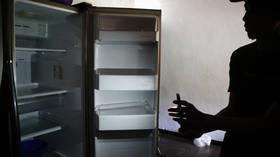Savings from unplugging fridge not worth food poisoning – UK health authorities

Turning the refrigerator off to save on electric bills “creates the risk of infection in food,” the UK Health Security Agency warned budget-conscious Brits on Wednesday as energy bills soar. Food poisoning is the result, with sudden-onset stomach cramps, diarrhea, and vomiting that can be potentially life-threatening in the elderly or infirm.
The man-made threat of food poisoning adds to the already formidable “triple threat” that Health Secretary Steve Barclay sees looming on the horizon: the soaring cost of living, another wave of Covid-19 cases, and the return of the flu, which vanished completely last year due to the use of hand sanitizer and masks, according to Public Health England.
While people shouldn’t scrimp on refrigeration, nor should they attempt to save money by turning off their heaters during winter, Health Security Agency chief Dame Jenny Harries warned, noting that having sufficient heat “is an essential part of their health.” People should heat their homes to at least 18 degrees Celsius in winter and make up the difference in warm clothing if necessary.
Instead of fiddling with the heat or cold, shut off the television or other electronic devices, and unplug those that are on standby mode, Harries suggested. She did not offer advice for those whose electricity had been shut off for non-payment.
While it’s not clear how many actual people have succumbed to food poisoning due to the well-intentioned unplugging of their refrigerators, a Cornwall food bank claimed in May that children were suffering from upset tummies due to their parents pulling the plug to save money.
Inflation in the UK hit 10.1% on Wednesday, its sharpest increase in 40 years. The value of the currency is declining so quickly that the value of the average paycheck excluding bonuses is down 2.8% from last year when adjusted for inflation – the fastest drop since the UK began keeping records – and the consumer price index is rising even faster than in the US and Europe.
Meanwhile, energy bills are set to hit £5,500 ($6,629) in April. The average household energy bill has risen over 50% this year alone, and gas prices surged again on Monday. Energy consultancy Auxilione predicts the average household will be paying an annual bill of £4,650 ($4,734) from January and £5,456 ($5,555) from April.
And the high cost of energy is here to stay, according to some experts. Energy market firm Cornwall Insight estimates prices will remain high until at least 2030, pointing out that the UK is shutting down coal-fired power plants and many nuclear plants are reaching the end of their lifespan, while the embargo on Russian oil and gas is forcing the country to compete with every other European nation to source natural gas from elsewhere.













